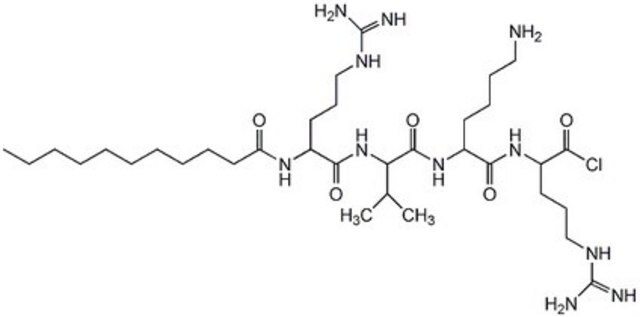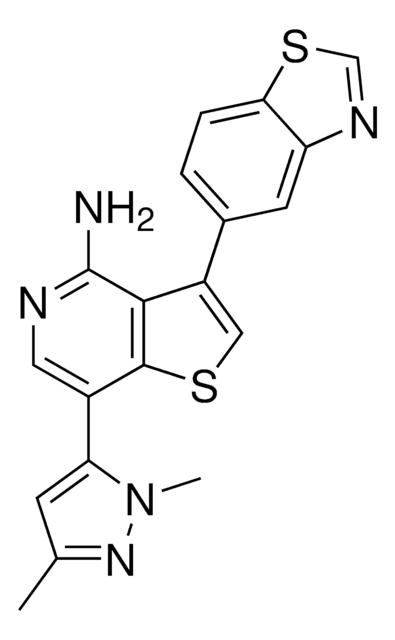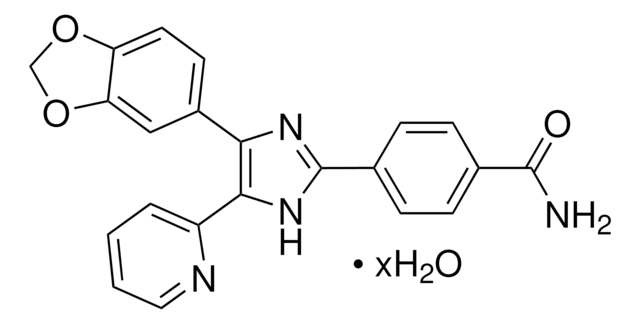480001
NDSB-195
A non-detergent sulfobetaine. Reported to prevent protein aggregation and facilitate the renaturation of chemically and thermally denatured proteins.
Synonim(y):
NDSB-195, Dimethylethylammonium Propane Sulfonate
Zaloguj sięWyświetlanie cen organizacyjnych i kontraktowych
About This Item
Wzór empiryczny (zapis Hilla):
C7H17NO3S
Numer CAS:
Masa cząsteczkowa:
195.28
Kod UNSPSC:
12611902
NACRES:
NA.21
Polecane produkty
Poziom jakości
Próba
≥95% (TLC)
Formularz
solid
producent / nazwa handlowa
Calbiochem®
warunki przechowywania
OK to freeze
desiccated (hygroscopic)
kolor
white
rozpuszczalność
water: soluble
Warunki transportu
ambient
temp. przechowywania
15-25°C
Opis ogólny
A non-detergent sulfobetaine. Reported to prevent protein aggregation and facilitate the renaturation of chemically and thermally denatured proteins. Zwitterionic over a wide pH range. Does not absorb significantly in the near-UV range. Easily removed by dialysis.
Zastosowanie
- Protein stabilizer, NDSB-195, enhances the dynamics of the β4 -α2 loop of ubiquitin.: This research explores how NDSB-195 stabilizes proteins by enhancing the dynamics of the β4-α2 loop of ubiquitin, providing insights into its mechanism of action as a protein stabilizer (Wang et al., 2016).
- Suppression of problematic compound oligomerization by cosolubilization of nondetergent sulfobetaines.: The study demonstrates the effectiveness of NDSB-195 in suppressing the oligomerization of problematic compounds, showcasing its utility in biochemical and pharmaceutical applications (Mizukoshi et al., 2015).
- Interaction of anti-aggregation agent dimethylethylammonium propane sulfonate with acidic fibroblast growth factor.: This article discusses the interaction of NDSB-195 with acidic fibroblast growth factor, emphasizing its role in preventing protein aggregation during biochemical processes (Xiang et al., 2008).
- Preparation, crystallization and preliminary X-ray diffraction analysis of the DNA-binding domain of the Ets transcription factor in complex with target DNA.: The study uses NDSB-195 in the preparation and crystallization process, enhancing the stability and quality of the DNA-binding domain crystals for X-ray diffraction analysis (Suwa et al., 2008).
Ostrzeżenie
Toxicity: Irritant (B)
Inne uwagi
Goldberg, M.E., et al. 1996. Folding & Design 1, 21.
Vuillard, L., et al. 1995. Anal. Biochem. 230, 290.
Vuillard, L., et al. 1995. Biochem. J. 305, 337.
Vuillard, L., et al. 1994. FEBS Lett.353, 294.
Vuillard, L., et al. 1995. Anal. Biochem. 230, 290.
Vuillard, L., et al. 1995. Biochem. J. 305, 337.
Vuillard, L., et al. 1994. FEBS Lett.353, 294.
Informacje prawne
CALBIOCHEM is a registered trademark of Merck KGaA, Darmstadt, Germany
Ta strona może zawierać tekst przetłumaczony maszynowo.
Kod klasy składowania
11 - Combustible Solids
Klasa zagrożenia wodnego (WGK)
WGK 3
Certyfikaty analizy (CoA)
Poszukaj Certyfikaty analizy (CoA), wpisując numer partii/serii produktów. Numery serii i partii można znaleźć na etykiecie produktu po słowach „seria” lub „partia”.
Masz już ten produkt?
Dokumenty związane z niedawno zakupionymi produktami zostały zamieszczone w Bibliotece dokumentów.
Nasz zespół naukowców ma doświadczenie we wszystkich obszarach badań, w tym w naukach przyrodniczych, materiałoznawstwie, syntezie chemicznej, chromatografii, analityce i wielu innych dziedzinach.
Skontaktuj się z zespołem ds. pomocy technicznej







